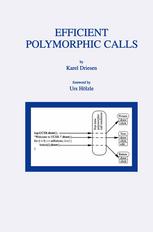

Most ebook files are in PDF format, so you can easily read them using various software such as Foxit Reader or directly on the Google Chrome browser.
Some ebook files are released by publishers in other formats such as .awz, .mobi, .epub, .fb2, etc. You may need to install specific software to read these formats on mobile/PC, such as Calibre.
Please read the tutorial at this link: https://ebookbell.com/faq
We offer FREE conversion to the popular formats you request; however, this may take some time. Therefore, right after payment, please email us, and we will try to provide the service as quickly as possible.
For some exceptional file formats or broken links (if any), please refrain from opening any disputes. Instead, email us first, and we will try to assist within a maximum of 6 hours.
EbookBell Team

5.0
60 reviewsThe implementation of object-oriented languages has been an active topic of research since the 1960s when the first Simula compiler was written. The topic received renewed interest in the early 1980s with the growing popularity of object-oriented programming languages such as c++ and Smalltalk, and got another boost with the advent of Java. Polymorphic calls are at the heart of object-oriented languages, and even the first implementation of Simula-67 contained their classic implementation via virtual function tables. In fact, virtual function tables predate even Simula-for example, Ivan Sutherland's Sketchpad drawing editor employed very similar structures in 1960. Similarly, during the 1970s and 1980s the implementers of Smalltalk systems spent considerable efforts on implementing polymorphic calls for this dynamically typed language where virtual function tables could not be used. Given this long history of research into the implementation of polymorphic calls, and the relatively mature standing it achieved over time, why, one might ask, should there be a new book in this field? The answer is simple. Both software and hardware have changed considerably in recent years, to the point where many assumptions underlying the original work in this field are no longer true. In particular, virtual function tables are no longer sufficient to implement polymorphic calls even for statically typed languages; for example, Java's interface calls cannot be implemented this way. Furthermore, today's processors are deeply pipelined and can execute instructions out-of order, making it difficult to predict the execution time of even simple code sequences.